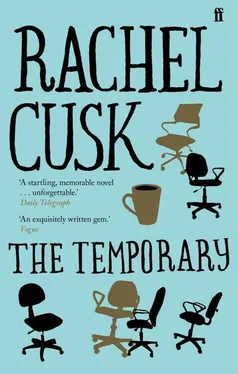Rachel Cusk - The Temporary
Здесь есть возможность читать онлайн «Rachel Cusk - The Temporary» весь текст электронной книги совершенно бесплатно (целиком полную версию без сокращений). В некоторых случаях можно слушать аудио, скачать через торрент в формате fb2 и присутствует краткое содержание. Год выпуска: 2013, Издательство: Faber & Faber, Жанр: Современная проза, на английском языке. Описание произведения, (предисловие) а так же отзывы посетителей доступны на портале библиотеки ЛибКат.
- Название:The Temporary
- Автор:
- Издательство:Faber & Faber
- Жанр:
- Год:2013
- ISBN:нет данных
- Рейтинг книги:5 / 5. Голосов: 1
-
Избранное:Добавить в избранное
- Отзывы:
-
Ваша оценка:
- 100
- 1
- 2
- 3
- 4
- 5
The Temporary: краткое содержание, описание и аннотация
Предлагаем к чтению аннотацию, описание, краткое содержание или предисловие (зависит от того, что написал сам автор книги «The Temporary»). Если вы не нашли необходимую информацию о книге — напишите в комментариях, мы постараемся отыскать её.
The Temporary — читать онлайн бесплатно полную книгу (весь текст) целиком
Ниже представлен текст книги, разбитый по страницам. Система сохранения места последней прочитанной страницы, позволяет с удобством читать онлайн бесплатно книгу «The Temporary», без необходимости каждый раз заново искать на чём Вы остановились. Поставьте закладку, и сможете в любой момент перейти на страницу, на которой закончили чтение.
Интервал:
Закладка:
His patchy performance in the closing stages of the previous week made the proper execution of the day imperative. He had been distracted on Thursday, his mind crowded with what proved to be unplayed scenes, his body bent on leaving early, and on Friday he had been morose and unwell. He had run into debt and must use today to replenish his reserves of good conduct. Once their taste was acquired, such disruptions of routine could, he knew, lead to larger rebellions. Ralph feared the prospect of his own disobedience, and although he had never really detected in himself any sign that he might one day decide, for perhaps no reason other than perversity, not to follow the path that necessity had laid down for him, still he remained vigilant against the possibility of his insurrection. He couldn’t afford to entertain ideas of his own freedom: once admitted, he could not be sure of ever persuading them to leave. It was not that he judged himself particularly prone to being led astray, but he had always ascribed the right to build fantastical, foolish plans as belonging to those whose foundations were secure. He didn’t regard the people he knew as dependent, exactly, but he felt sure that they would never be permitted to slide into poverty or destitution: there would always be someone, some relative who could be dug up and appealed to, someone who would feel pity or guilt at their demise. Ralph was alone, and although sometimes he could go for weeks without really thinking of his solitude, some deeper instinct always remembered it. It was a mercy not to think of it too often, in fact, because when he did he would often grow angry or morose at the relentless contingency of everything in his life; and what was the point of self-pity if there was nobody to pity you for it? He had learned to accept certain things: the inescapability of work, regardless of whether he enjoyed it or not; and the possibility that no one might care if he lost everything. Stephen would mind, probably, but he couldn’t be counted on really to care in any useful way.
Ralph supposed that his situation carried within it the danger of relying too much on love to swaddle him in illusions of security. That had been the problem with Belinda, really, because he had somehow got the impression that his orphaning, his terrible aloneness, was one of the things for which she loved him. She used to ask him about it all the time, wanting to know exactly when each beam had rotted and given way and how he had felt as the sky and ground came terrifyingly into view; and he would enjoy watching her face soften with sympathy as he told her, knowing that his subscription to things he hadn’t really felt, but knew none the less to be tragic, would make her care for him. In the end, though, the feelings gave him no pleasure, for they were impersonal, humanitarian things, and Belinda had grown tired of it as her love curdled to pity and then, he feared, contempt. He suspected that the lack of visible evidence of how he had come to exist made people uncomfortable with him. For a while, certainly, he was unusual, but eventually he was only odd and difficult to fit into the scheme of things. He had come to regard his solitude as a principle by which people felt it correct to act, a feature which generated its own response: he had been deserted, therefore it was possible, necessary even, to desert him.
Stephen was different, Ralph supposed, in that it never seemed to occur to him not to be Ralph’s friend. Their alliance was what Ralph imagined to be brotherly, an unquestioned linkage which demanded no particular profit or return and which didn’t seem to have arisen out of personal choice. It irritated Ralph that he sometimes wondered why Stephen stuck with him; partly because he knew it never occurred to Stephen to wonder the same thing about Ralph, but largely because his criticisms of Stephen were deep and should not have manufactured a sense of good fortune at Stephen’s friendship as their irrational by-product. He supposed it was an unreformed conviction of their schooldays, when Stephen had been a princely character whose patronage was an asset. If Ralph was honest it had been his only asset, the thing that had got him through it all.
Stephen had never asked about Ralph’s parents, although when his father died at the end of Ralph’s first year at the school and he had had to go to Stephen’s house for the summer holidays, Stephen had been kind to him in a clumsy way and patted him on the back once or twice. When they went back for the new term, they had gone on a school trip. As the bus wound its way through the outskirts of the town, Ralph had suddenly recognized the road in which he had lived with his mother and father when he was younger. He had gazed out of the window and as they approached his old house he had turned to Stephen to point it out.
‘ Plebsville ,’ Stephen had said before he could speak, following Ralph’s eyes through the window. He made the hilarious vomiting noise which they had lately been using to signal disgust or contempt. For a moment Ralph had a strange feeling in his stomach, but then he had made the noise too and had sat back in his seat, glad that he hadn’t said anything.
It made him sad to think about that now, although he scarcely remembered his mother any more and the confused, itinerant portion of his life with his father had long since supplanted the old house with a set of diffuse, unrelated memories. He remembered running into their bedroom, though, early in the morning, and climbing up on the bed beside his mother in her nightdress. Her bare arms used to seem colossal to him, riven with a delta of frightening veins, but he had loved the way she smelled in the mornings. Later in the day she would be perfumed and distant, but in the morning she had a human smell, a smell of herself, which made him burrow against her like an animal. She was called Angela, although remembering her name made her recede even further in Ralph’s mind. His father had always called her ‘Mother’, which now struck Ralph as strange, but at the time had seemed a natural extension of his partnership with his father against her hygienic and dissatisfied leadership.
‘Better shape up,’ he would whisper to Ralph, as his mother swept in some nameless fury through the small rooms of their house. ‘Else Mother’ll have us.’
The bus had heaved itself past the traffic lights and was now thundering down the Holloway Road towards Ralph’s stop. Returning from his recollections he felt all at once rather lost and he reminded himself of the suddenly distant necessity for getting off the bus and going to work. He stood up, clinging to the metal poles as he staggered along the swaying platform. His body felt large and heavy, as if he had just woken from a dream and found it newly so. The bus stopped and he disembarked. Hurrying along the pavement towards his office building, he saw himself calling for his mother through the quiet house when he came home from school one day, worrying that she wasn’t there. He had used to call her ‘Mummy’, and he remembered now that she hadn’t liked it.
‘You sound like a little pansy,’ she had said, emerging wearily from the bedroom as he stood calling her in the hall. Her face was full of secrets. ‘What’s wrong with “Mum”?’
He opened the door and walked quickly across the foyer to the stairs. He hadn’t thought of that in years.
*
‘Good weekend?’ said Roz, who sat opposite him.
Their desks were pushed together at the front to form a square, a contact Ralph found obscurely intimate. Roz was in charge of the office computer and had discovered how to play games on the screen. She would sit for hours at solitaire, or a faster game involving spinning meteors which made explosive noises, and Ralph would grow infuriated at the incessant clicking and the blank rapture of Roz’s face, sighing and clearing his throat to no avail.
Читать дальшеИнтервал:
Закладка:
Похожие книги на «The Temporary»
Представляем Вашему вниманию похожие книги на «The Temporary» списком для выбора. Мы отобрали схожую по названию и смыслу литературу в надежде предоставить читателям больше вариантов отыскать новые, интересные, ещё непрочитанные произведения.
Обсуждение, отзывы о книге «The Temporary» и просто собственные мнения читателей. Оставьте ваши комментарии, напишите, что Вы думаете о произведении, его смысле или главных героях. Укажите что конкретно понравилось, а что нет, и почему Вы так считаете.












